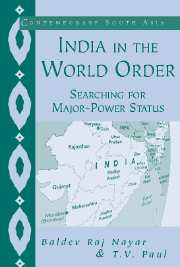Book contents
- Frontmatter
- Contents
- Acknowledgements
- 1 Introduction: India and Its Search for a Major-Power Role
- 2 Major-Power Status in the Modern World: India in Comparative Perspective
- 3 The Constraints on India: International and Domestic
- 4 Nehru's Grand Strategy for a Major-Power Role, 1947—1964
- 5 Strategy in Hard Times: The Long March for Capabilities, 1964—1990
- 6 After the Cold War: Adaptation, Persistence and Assertion, 1991—2001
- 7 Conclusions: India and the Emerging International Order
- Bibliography
- Index
7 - Conclusions: India and the Emerging International Order
Published online by Cambridge University Press: 05 July 2014
- Frontmatter
- Contents
- Acknowledgements
- 1 Introduction: India and Its Search for a Major-Power Role
- 2 Major-Power Status in the Modern World: India in Comparative Perspective
- 3 The Constraints on India: International and Domestic
- 4 Nehru's Grand Strategy for a Major-Power Role, 1947—1964
- 5 Strategy in Hard Times: The Long March for Capabilities, 1964—1990
- 6 After the Cold War: Adaptation, Persistence and Assertion, 1991—2001
- 7 Conclusions: India and the Emerging International Order
- Bibliography
- Index
Summary
This book has had as its subject matter India's long but unfinished journey toward becoming a major power. It has been concerned with questions such as: Has India had the aim to become a major power? Since when? How consistently has it pursued that end? Has it worked to acquire the wherewithal for that end? How consistently? What are the constraints that it has faced in the endeavor? The present chapter summarizes the various issues raised in the book, and then briefly discusses the appropriate strategies that are feasible for India to become a major power, as well as the question of adjustment of the major-power system to the phenomenon of rising powers in an era when the traditional recourse to violence is too risky to contemplate. These issues are of theoretical and empirical significance in the treatment of India's ambition for a major-power role.
The theory: Realism and state behavior
Major power, or more particularly great power as conventionally used, is a concept that is central to the paradigm of realism in the study of international relations, as is the related concept of the major-power system. The very centrality of power in realism makes these concepts critical to that paradigm. By virtue of the broad array of capabilities they command, major powers determine, whether in conflict or cooperation, the nature of the international system and its future development in the endeavor to advance their particular interests as regards security and welfare.
- Type
- Chapter
- Information
- India in the World OrderSearching for Major-Power Status, pp. 249 - 271Publisher: Cambridge University PressPrint publication year: 2002



